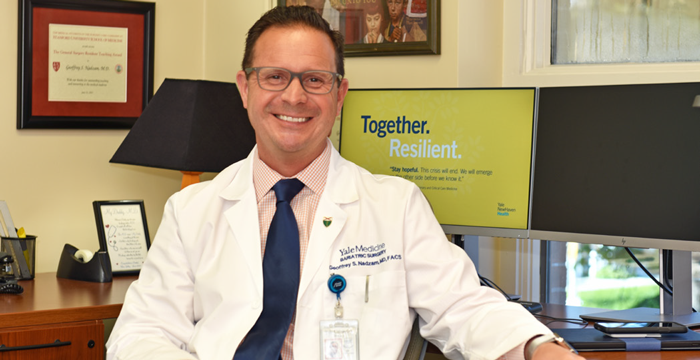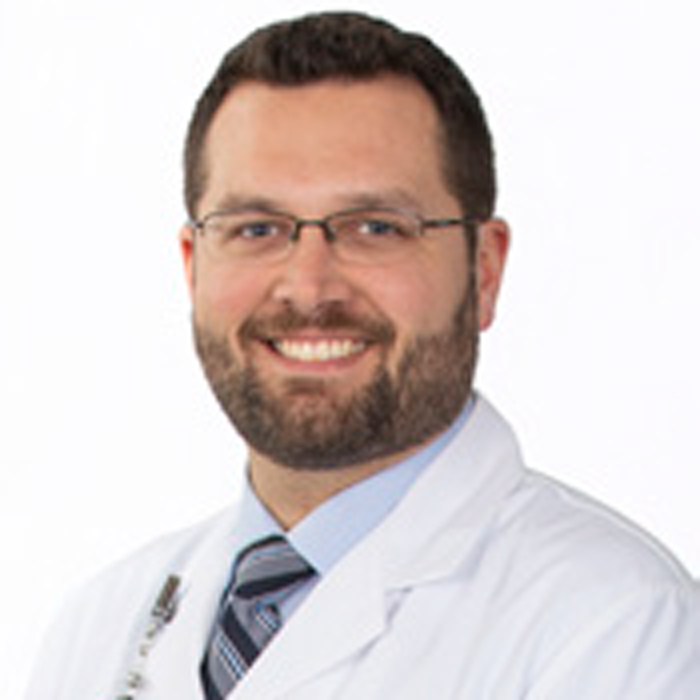-
Services
Featured Specialties
-
Locations
Location Type
-
Patients & Visitors
Geoffrey Nadzam, MD, chair of Surgery at Lawrence + Memorial Hospital, knows the public may be fearful as well as curious about the resumption of elective surgeries during the pandemic.

“We always put safety first, but we have implemented new safety measures specific to COVID-19 that are designed to ensure that each patient is cared for within a continuum of overarching safety,” Dr. Nadzam said.
“We have thought through every facet of what we do, and patients will be protected from the moment they arrive at our doors to the time they go home. And so will our staff.”
Among the most obvious changes for surgical patients is the requirement of being masked upon arrival at the hospital. Each patient scheduled for surgery is also required to have a COVID-19 test two days prior to any procedure or operation. They must agree to stay isolated until the day of surgery.
Inside the operating rooms, staff are taking extra precautions performing procedures with higher risk for possible exposure, such as intubation. “If a breathing tube is required, we will take extra precautions using proper personal protective equipment to protect our OR staff and patients alike,” Dr. Nadzam said. “However, our guidelines for infection control within our operating rooms are very strict, so, in most cases, we are already taking the necessary precautions to ensure the safety of our patients and our staff.”
Another goal is to minimize the time patients stay in the hospital after surgery and follow procedures that were in place even before COVID-19 to determine when a patient is strong enough to leave the hospital safely.
Patients who are COVID-19 positive are cared for in special isolation areas by different clinical staff.
Hospitals in Connecticut and across the nation cancelled elective surgeries during the height of the pandemic in April and May. Hospitals within the Yale New Haven Health System, including L+M, resumed some elective surgeries in June.
With locations in New London and Groton, emergency medical care at L+M combines state-of-the-art technology, time-saving processes and personal attention.
Lawrence + Memorial Hospital - New London
L+M’s emergency capabilities are among the most sophisticated in the region with, for example, the only emergency angioplasty program for heart attack victims in all of eastern Connecticut. L+M also has an award-winning Stroke Center, full diagnostic imaging capabilities (such as CT and MRI), and a separate Pediatric Emergency Department.
365 Montauk Ave., New London, CT 06320
Emergency Dept.: open 24/7
Pediatric Emergency Dept.: open 7 days a week, 3 pm – 11 pm
52 Hazelnut Hill Road, Groton, CT 06340
Emergency Dept.: open 7 days a week, 7 am - 11 pm

Lawrence + Memorial Hospital has a long history of specializing in advanced, minimally invasive spine surgery and is certified by the Joint Commission for cervical, thoracic, and lumbar spinal surgery. Medical expertise supported by advanced technology like the ExcelsiusGPS® system allows L+M’s Spine Center team to bring a high rate of successful outcomes to patients, reducing their pain and allowing them to live a more active life.
Peter Wagner, MD, orthopedic surgeon, performed the first major spinal deformity operation using robotic navigation at L+M. Dr. Wagner used the robotic arm to conduct a T7-pelvis posterior spinal fusion procedure on a patient with scoliosis that caused debilitating back pain and the inability to stand up straight. Dr. Wagner explained that the procedure was to realign his spine and reduce his pain. “Putting in screws would have taken several hours without the robot. Also, we were able to accomplish the entire procedure in one day, when otherwise without that technology, we would have had to stage the procedure over several days.”
Within days after surgery, Dr. Wagner’s patient was able to stand and walk upright for the first time in years. Read another patient story.